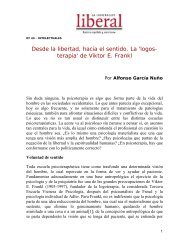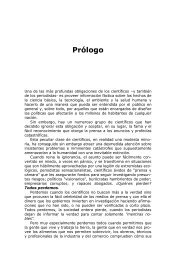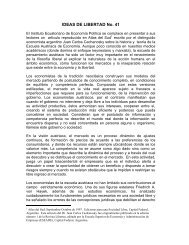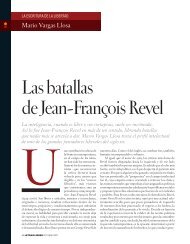Darfur: Blueprint for Genocide - Archipielago Libertad
Darfur: Blueprint for Genocide - Archipielago Libertad
Darfur: Blueprint for Genocide - Archipielago Libertad
You also want an ePaper? Increase the reach of your titles
YUMPU automatically turns print PDFs into web optimized ePapers that Google loves.
EXECUTIVE SUMMARY<br />
Executive Summary<br />
International law allows wide scope <strong>for</strong> preventing genocide. There are huge moral and political obligations to do so.<br />
The United Nations <strong>Genocide</strong> Convention (1948) sets a clear legal framework enabling prevention. Resolve and action to<br />
prev ent depend, however, on the politicalw ill to do so.<br />
The presence of an exclusionary ideology (usually meaning institutionalised or organised racism) helps to differentiate<br />
a genocidal situation from a two-sided conflict. <strong>Genocide</strong> is organised violence on a massive scale, but it is more akin to<br />
ex treme racism than ex tremeconflict.<br />
Exclusionary ideology sets the scene <strong>for</strong> future genocide. It justifies in the mind of a dominant group extreme measures<br />
that can be taken against the perceived inferior and vulnerable group. What matters in a genocidal situation is how a<br />
dominant group perceives both itself and the vulnerable group. Perpetrators of genocide do not invent the identity of<br />
groups, but they are obsessedwith identify . They augment it, simplify it andcreate an enemy.<br />
<strong>Darfur</strong> is suffering the outcomes of ethnic and tribal conflict, power struggles and competition <strong>for</strong> land. In recent decades,<br />
how ever, an exclusionary ideology has driven policies of the current and previous Government of Sudan (GoS) that have<br />
led to jihad and outcomes that can be regarded as genocide.<br />
The crisis in <strong>Darfur</strong> is happening in that context and is also driven by the supremacist / racist ideas of the Arab Gathering,<br />
ideas congruent w ith those of central government in Khartoum. (Arab Gathering documents which as yet Aegis has not<br />
been able to authenticate are presented in the Appendices. How ever, we believe it is likely that these are genuine<br />
documents and regard it as important that they are seen.) Since the emergence of these ideas in a letter addressed to the<br />
Sudanese Prime Minister in 1987 (See Appendix D), v iolence against Africans in Western Sudan has increased and<br />
becomemore organised.<br />
In <strong>Darfur</strong>, despite the complexity of ethnicity that ex ists, Arab supremacists are now promoting the words ‘Zurga’ (nigger)<br />
and ‘Abid’ (slav e), drawing on stereoty pes and discrimination of the past where an ‘African’ identity was regarded as being<br />
synonymous with slav e.<br />
When civilians are being systematically targeted during a crisis and an exclusionary ideology exists, recognising the<br />
genocidal threat is more important than defining a situation as genocide. In such a situation, the crimes being committed<br />
may be referred to as crimes against humanity, ethnic cleansing or genocide. Such instances should be described as<br />
genocidal regardless of whether a consensus is reached about whether it is genocide or not. The political and moral<br />
obligations to prevent are as strongwhen genocide is threatened, as when it is agreed that it is happening. Indeed by the<br />
time the situation is defined, it may be too late to prevent. So the term genocidal may be used to indicate a risk<br />
assessment, not provide a legal conclusion.<br />
The term genocidal should signify a change in the priorities in the management of the crisis. In such a situation, security<br />
<strong>for</strong> those at risk must be regarded as much a priority as providing humanitarian aid and achieving political settlement. In a<br />
genocidal situation, compromisingsecurity in fav our of peace-talks may cost lives.<br />
In <strong>Darfur</strong> either the GoS was actively supporting the Janjaweed or it had lost control of them. Both scenarios demanded<br />
outside help. The InternationalCommission <strong>for</strong> Interv ention and State Sov ereignty concluded in 2001 that w hen sovereign<br />
states are unwilling or unable to protect their own citizens, the responsibility must be borne by the broader community of<br />
states. Yet it was the Government of Sudan that w as asked by the United Nations (UN) to provide protection <strong>for</strong> the<br />
vulnerable. Attacks on internally displaced persons (IDP) camps in November by Sudanese security <strong>for</strong>ces demonstrate<br />
that the need <strong>for</strong>security is as pressing as ever.<br />
vii



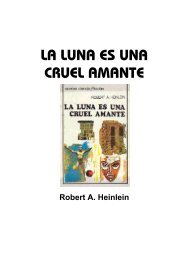
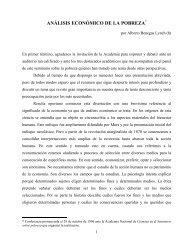
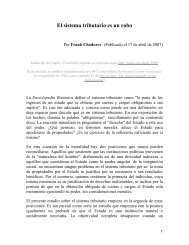
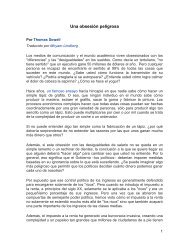
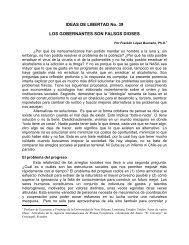
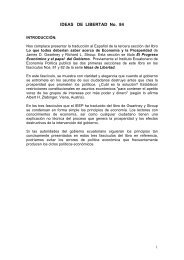
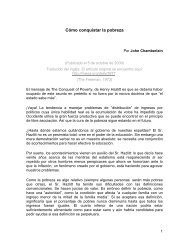
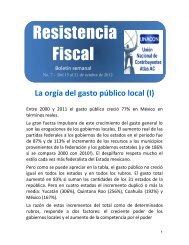
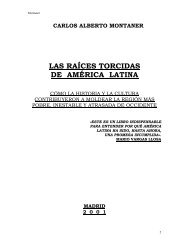
![0091 Stewart - La magia y el misterio del comercio [parte I].pdf](https://img.yumpu.com/16943279/1/169x260/0091-stewart-la-magia-y-el-misterio-del-comercio-parte-ipdf.jpg?quality=85)
